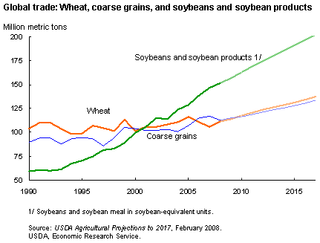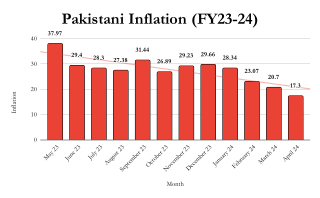Related Research Articles

A cereal is a grass cultivated for its edible grain. Cereals are the world's largest crops, and are therefore staple foods. They include rice, wheat, rye, oats, barley, millet, and maize. Edible grains from other plant families, such as buckwheat and quinoa, are pseudocereals. Most cereals are annuals, producing one crop from each planting, though rice is sometimes grown as a perennial. Winter varieties are hardy enough to be planted in the autumn, becoming dormant in the winter, and harvested in spring or early summer; spring varieties are planted in spring and harvested in late summer. The term cereal is derived from the name of the Roman goddess of grain crops and fertility, Ceres.

Pasta is a type of food typically made from an unleavened dough of wheat flour mixed with water or eggs, and formed into sheets or other shapes, then cooked by boiling or baking. Pasta was traditionally only made with durum, although the definition has been expanded to include alternatives for a gluten-free diet, such as rice flour, or legumes such as beans or lentils. While Asian noodles originated in China, pasta is believed to have developed independently in Italy and is a staple food of Italian cuisine, with evidence of Etruscans making pasta as early as 400 BCE in Italy.

Flour is a powder made by grinding raw grains, roots, beans, nuts, or seeds. Flours are used to make many different foods. Cereal flour, particularly wheat flour, is the main ingredient of bread, which is a staple food for many cultures. Corn flour has been important in Mesoamerican cuisine since ancient times and remains a staple in the Americas. Rye flour is a constituent of bread in both Central Europe and Northern Europe.

The Irish Famine of 1740–1741 in the Kingdom of Ireland, is estimated to have killed between 13% and 20% of the 1740 population of 2.4 million people, which was a proportionately greater loss than during the Great Famine of 1845–1852.

Chapati, also known as roti, rooti, rotee, rotli, rotta, safati, shabaati, phulka, chapo, sada roti, poli, and roshi, is an unleavened flatbread originating from the Indian subcontinent and is a staple in India, Nepal, Bangladesh, Pakistan, Kyrgyzstan, Sri Lanka, the Arabian Peninsula, East Africa, and the Caribbean. Chapatis are made of whole-wheat flour known as atta, mixed into dough with water, oil (optional), and salt (optional) in a mixing utensil called a parat, and are cooked on a tava.

White bread typically refers to breads made from wheat flour from which the bran and the germ layers have been removed from the whole wheatberry as part of the flour grinding or milling process, producing a light-colored flour.

A flatbread is bread made usually with flour; water, milk, yogurt, or other liquid; and salt, and then thoroughly rolled into flattened dough. Many flatbreads are unleavened, although some are leavened, such as pita bread.

Pakistan Petroleum Limited (PPL) (Urdu: پاکستان پیٹرولیم) is a Pakistani state-owned petroleum company headquartered in Karachi. It operates major oil and gas fields, including the Sui gas field, has non-operating interests in other fields, and has an interest in an exploration portfolio onshore and offshore. Its managing director reports to the Petroleum Secretary of Pakistan.

Lahoh, is a spongy, flat pancake-like bread. It is a type of flat bread eaten regularly in Somalia, Djibouti, Kenya, Ethiopia, Yemen and Saudi Arabia. Yemenite Jewish immigrants popularized the dish in Israel. It is called Canjeero/Canjeelo in southern Somalia and also called Laxoox/Lahoh in Somaliland, Djibouti, Yemen and Saudi Arabia respectively.

Agriculture is considered the backbone of Pakistan's economy, which relies heavily on its major crops. Pakistan's principal natural resources are arable land and water. Agriculture accounts for about 18.9% of Pakistan's GDP and employs about 42.3% of the labour force. The most agricultural province is Punjab where wheat & cotton are the most grown. Mango orchards are mostly found in Sindh and Punjab provinces, making it the world's fourth largest producer of mangoes.

World food prices increased dramatically in 2007 and the first and second quarter of 2008, creating a global crisis and causing political and economic instability and social unrest in both poor and developed nations. Although the media spotlight focused on the riots that ensued in the face of high prices, the ongoing crisis of food insecurity had been years in the making. Systemic causes for the worldwide increases in food prices continue to be the subject of debate. After peaking in the second quarter of 2008, prices fell dramatically during the late-2000s recession but increased during late 2009 and 2010, reaching new heights in 2011 and 2012 at a level slightly higher than the level reached in 2008. Over the next years, prices fell, reaching a low in March 2016 with the deflated Food and Agriculture Organization (FAO) food price index close to pre-crisis level of 2006.
The 2000s commodities boom or the commodities super cycle was the rise of many physical commodity prices during the early 21st century (2000–2014), following the Great Commodities Depression of the 1980s and 1990s. The boom was largely due to the rising demand from emerging markets such as the BRIC countries, particularly China during the period from 1992 to 2013, as well as the result of concerns over long-term supply availability. There was a sharp down-turn in prices during 2008 and early 2009 as a result of the credit crunch and European debt crisis, but prices began to rise as demand recovered from late 2009 to mid-2010.

The National Food Security Act 2013, also known as Right to Food Act, is an Indian Act of Parliament which aims to provide subsidized food grains to approximately two thirds of the country's 1.4 billion people. It was signed into law on 12 September 2013, retroactive to 5 July 2013.

Bread has a significance beyond mere nutrition in many cultures in the Western world and Asia because of its history and contemporary importance. Bread is also significant in Christianity as one of the elements of the Eucharist; see sacramental bread. The word companion comes from Latin com- "with" + panis "bread".

The 1766 food riots took place across England in response to rises in the prices of wheat and other cereals following a series of poor harvests. Riots were sparked by the first largescale exports of grain in August and peaked in September–October. Around 131 riots were recorded, though many were relatively non-violent. In many cases traders and farmers were forced by the rioters to sell their wares at lower rates. In some instances, violence occurred with shops and warehouses looted and mills destroyed. There were riots in many towns and villages across the country but particularly in the South West and the Midlands, which included the Nottingham cheese riot.
During 2022 and 2023 there were food crises in several regions as indicated by rising food prices. In 2022, the world experienced significant food price inflation along with major food shortages in several regions. Sub-Saharan Africa, Iran, Sri Lanka, Sudan and Iraq were most affected. Prices of wheat, maize, oil seeds, bread, pasta, flour, cooking oil, sugar, egg, chickpea and meat increased. Many factors have contributed to the ongoing world food crisis. These include supply chain disruptions due to the COVID-19 pandemic, the 2021–2023 global energy crisis, the Russian invasion of Ukraine, and floods and heatwaves during 2021. Droughts were also a factor; in early 2022, some areas of Spain and Portugal lost 60–80% of their crops due to widespread drought.

Pakistan has experienced an economic crisis as part of the 2022 political unrest. It has caused severe economic challenges for months due to which food, gas and oil prices have risen.
The 2023–2024 Gilgit-Baltistan Protests, or Wheat protests in Gilgit-Baltistan are a series of protests, sit-ins, and demonstrations against the Federal Government of Pakistan and the Government of Gilgit-Balitistan in response to the dramatic increase in wheat prices in the region. Many of the protests have been organized by the Awami Action Committee.
The Pakistan wheat import scandal refers to a controversy that emerged in 2024, involving the importation of a significant amount of wheat by the caretaker government, despite the country having surplus wheat stocks. This decision allegedly caused a loss of more than 300 billion rupees to the national exchequer. The import of wheat was continued in the first two months of the Shehbaz Sharif government, as 778,000 metric tons worth of wheat, costing $231.32 million continued to be imported.
The 2024 Azad Kashmir protests were a series of six day long protests, sit-ins, shutter-downs, demonstrations and wheel-jam strikes starting on 8 May against the Federal Government of Pakistan and the Government of Azad Kashmir, calling for lower prices for wheat, flour, and electricity, in addition to other demands. Many of the protests were organized by the Joint Awami Action Committee (JAAC) of Azad Kashmir, representing a variety of interests including traders, transporters, lawyers and students. The government attempted to preempt a planned demonstration on 12 May by arresting the movement's leaders, which inflamed protests and led to deadly clashes. The protests were the culmination of a year-long movement against price rises and perceived injustices towards Azad Kashmir. The Federal government announced a Rs23 Billion ($82,685,321) grant to Azad Kashmir, which led to subsidized utility rates and wheat prices being announced on May 13, by the Prime Minister of AJK, Chaudhry Anwar-ul-Haq. On May 14, the JAAC called off the protests, announcing a ‘historic win’ as the government agreed to all demands.
References
- 1 2 Edelstein 2011.
- ↑ Shavelson 2015.
- 1 2 "Flour price soars to Rs70/kg". The Express Tribune . 18 January 2020. Retrieved 2020-01-21.
- ↑ Wasim, Amir (19 January 2020). "Wheat flour crisis deepens amid blame game - Pakistan". Dawn.Com. Retrieved 2020-01-20.